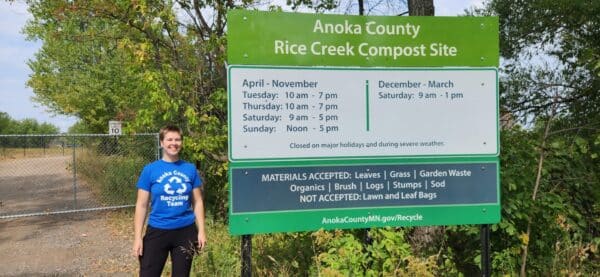Composting is for everyone! We all make waste from our kitchens and gardens that can be reused in our lives again through compost. Join us to explore the important ingredients and processes involved in creating compost. We'll meet Organic Recycling Coordinator Kathryn Jordan and learn how she helps Anoka County residents create a complete food cycle: food is grown and ate, food scraps are composted, and then the compost is added back to the soil to grow more food! This virtual field trip will last 30 minutes and is targeted to K-5 students.
About the Anoka County Rice Creek Compost Site
The Anoka County Compost Site is a waste collection and compost creation site. Residents of Anoka County can bring their kitchen and yard waste to contribute to the creation of the compost. Kathryn Jordan is the Organics Recycling Coordinator and provides a tour of the composting site.
What is Compost?
Compost is decayed, or broken-down pieces, of organic matter. Organic matter is anything that once was living. Kathryn describes the difference between soil and organic matter, and states that while they are similar, soil is made up of both organic matter and inorganic matter, whereas organic matter is purely material that was once alive. Inorganic matter examples in soil include rocks, sand, and clay. Because compost is made up of organic matter, it holds water well and provides healthy nutrients for plants.
How is Compost Made?
Compost is made by breaking down the organic material into smaller molecules. This process is called composting, and it occurs naturally very slowly. The composting process can be aided to help it move faster, and this is where sites like the Anoka County Rice Creek Compost Site come in to help. At the Anoka County Compost Site, they strive to create compost with two main “ingredients” for plants – carbon and nitrogen. To get carbon, the Anoka County Compost Site collects tree waste from local residents. They chip the tree waste into small particles, making a mulch. This wood chipping process is constantly being done, and it is the most labor-intensive process for the compost site. To get nitrogen, the site collects food scraps, including fruit peels, coffee grounds, meat scraps, and egg waste. Once they have both “ingredients” for composting, the site combines and mixes them. The mixed product is moved to a processing barn, where it sits to process in piles. Although the piles do not seem to be doing much, this is where the composting action happens. Tiny microorganisms, like bacteria and fungi, are eating and decaying the material as it sits. This causes heat to be built up inside of the piles, and the Anoka County Composting Site tests the bacterial activity of the piles using temperature probes to see how much heat the microorganisms are generating. In the barn, the piles must be mixed once a week to make sure that they are aerated, or have oxygen in them. If the piles are not aerated, bad bacteria can form and decay the material in a bad way. When the microbial activity starts to get cool, the piles sit and cure for a couple of weeks to a month to help stabilize the chemical reactions inside the pile. The whole composting process can take up to two months at the Anoka County Compost Site.

Finished Compost
Once the compost has cured and cooled, the Anoka County Compost Site offers it both screened and unscreened. The screening process is done when the compost is sold commercially. To screen the compost, the finished compost is run through a rotating drum that causes fine particles to fall into a pile and larger particles are filtered out to be worked into another cycle or to be removed (if they are contaminants). Unscreened compost is offered to residents of the county for free.
If you are interested in composting like the Anoka County Composting Site, Kathryn recommends starting in your school or home garden and mixing food waste with garden waste. Schools can also participate in composting projects by collecting the “ingredients'' on-site and bringing them to a local composting site like the Anoka County Composting Site.
